Ruotong Pan
Beyond Correctness: Benchmarking Multi-dimensional Code Generation for Large Language Models
Jul 16, 2024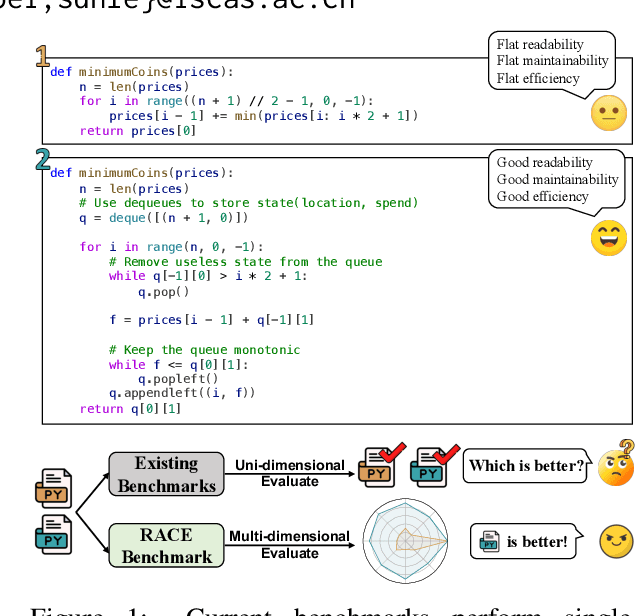
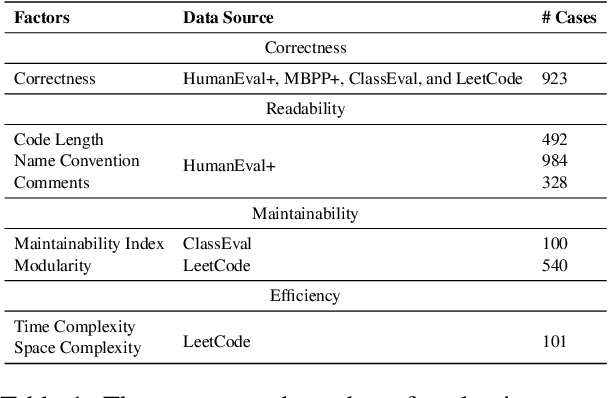
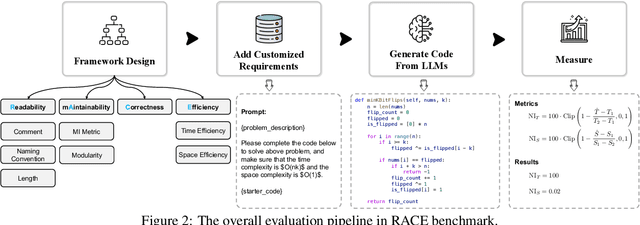
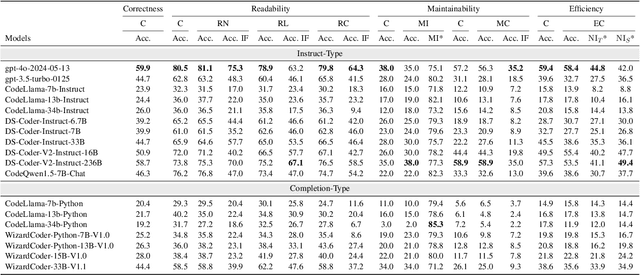
Abstract:In recent years, researchers have proposed numerous benchmarks to evaluate the impressive coding capabilities of large language models (LLMs). However, existing benchmarks primarily focus on assessing the correctness of code generated by LLMs, while neglecting other critical dimensions that also significantly impact code quality. Therefore, this paper proposes the RACE benchmark, which comprehensively evaluates the quality of code generated by LLMs across 4 dimensions: Readability, mAintainability, Correctness, and Efficiency. Specifically, considering the demand-dependent nature of dimensions beyond correctness, we design various types of user requirements for each dimension to assess the model's ability to generate correct code that also meets user demands. We evaluate 18 representative LLMs on RACE and find that: 1) the current LLMs' ability to generate high-quality code on demand does not yet meet the requirements of software development; 2) readability serves as a critical indicator of the overall quality of generated code; 3) most LLMs exhibit an inherent preference for specific coding style. These findings can help researchers gain a deeper understanding of the coding capabilities of current LLMs and shed light on future directions for model improvement.
Not All Contexts Are Equal: Teaching LLMs Credibility-aware Generation
Apr 10, 2024Abstract:The rapid development of large language models has led to the widespread adoption of Retrieval-Augmented Generation (RAG), which integrates external knowledge to alleviate knowledge bottlenecks and mitigate hallucinations. However, the existing RAG paradigm inevitably suffers from the impact of flawed information introduced during the retrieval phrase, thereby diminishing the reliability and correctness of the generated outcomes. In this paper, we propose Credibility-aware Generation (CAG), a universally applicable framework designed to mitigate the impact of flawed information in RAG. At its core, CAG aims to equip models with the ability to discern and process information based on its credibility. To this end, we propose an innovative data transformation framework that generates data based on credibility, thereby effectively endowing models with the capability of CAG. Furthermore, to accurately evaluate the models' capabilities of CAG, we construct a comprehensive benchmark covering three critical real-world scenarios. Experimental results demonstrate that our model can effectively understand and utilize credibility for generation, significantly outperform other models with retrieval augmentation, and exhibit resilience against the disruption caused by noisy documents, thereby maintaining robust performance. Moreover, our model supports customized credibility, offering a wide range of potential applications.
AI for social science and social science of AI: A Survey
Jan 22, 2024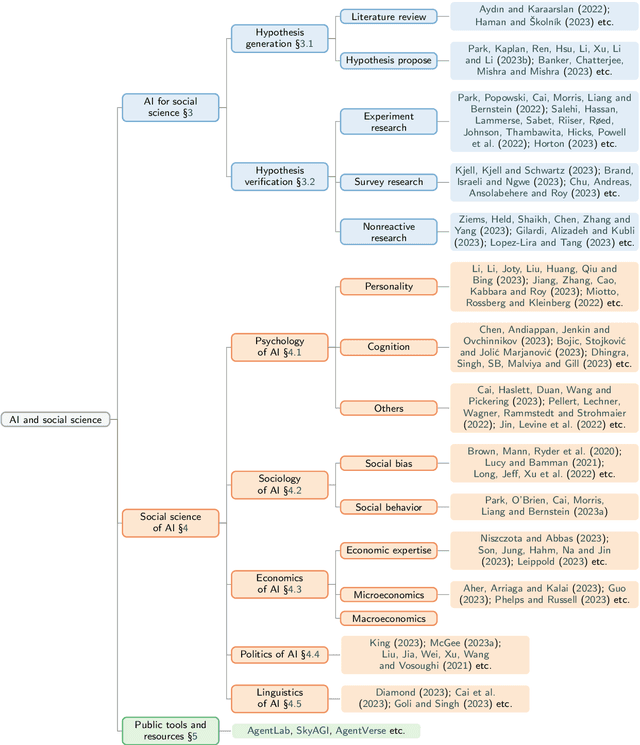
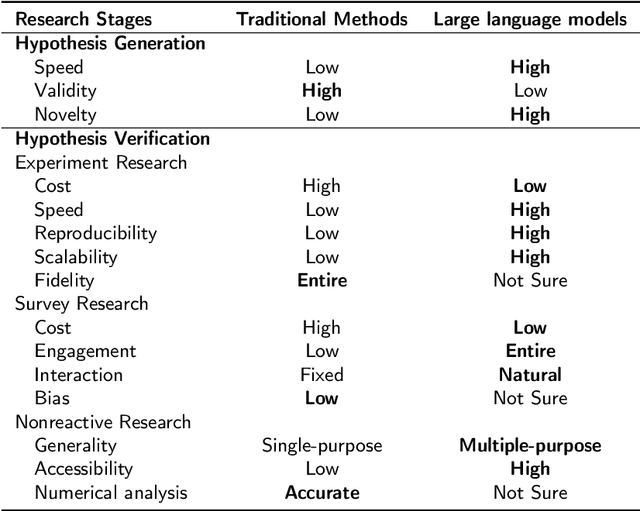
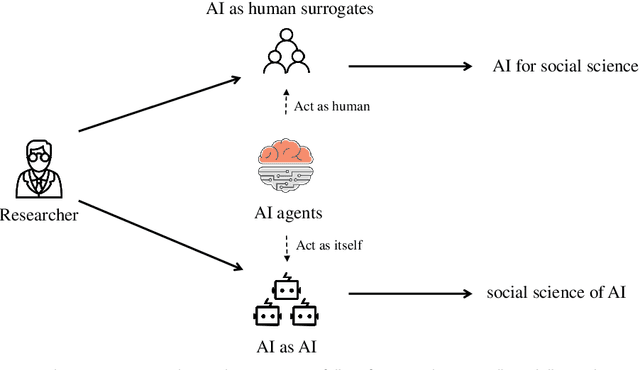
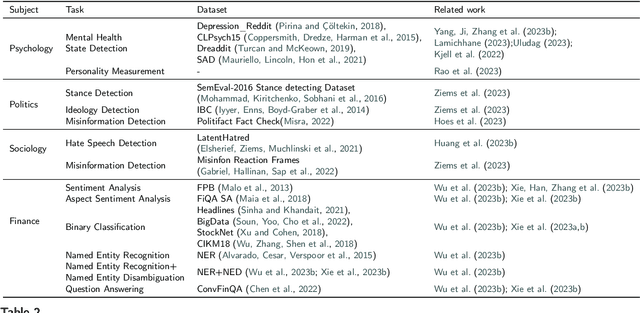
Abstract:Recent advancements in artificial intelligence, particularly with the emergence of large language models (LLMs), have sparked a rethinking of artificial general intelligence possibilities. The increasing human-like capabilities of AI are also attracting attention in social science research, leading to various studies exploring the combination of these two fields. In this survey, we systematically categorize previous explorations in the combination of AI and social science into two directions that share common technical approaches but differ in their research objectives. The first direction is focused on AI for social science, where AI is utilized as a powerful tool to enhance various stages of social science research. While the second direction is the social science of AI, which examines AI agents as social entities with their human-like cognitive and linguistic capabilities. By conducting a thorough review, particularly on the substantial progress facilitated by recent advancements in large language models, this paper introduces a fresh perspective to reassess the relationship between AI and social science, provides a cohesive framework that allows researchers to understand the distinctions and connections between AI for social science and social science of AI, and also summarized state-of-art experiment simulation platforms to facilitate research in these two directions. We believe that as AI technology continues to advance and intelligent agents find increasing applications in our daily lives, the significance of the combination of AI and social science will become even more prominent.
 Add to Chrome
Add to Chrome Add to Firefox
Add to Firefox Add to Edge
Add to Edge